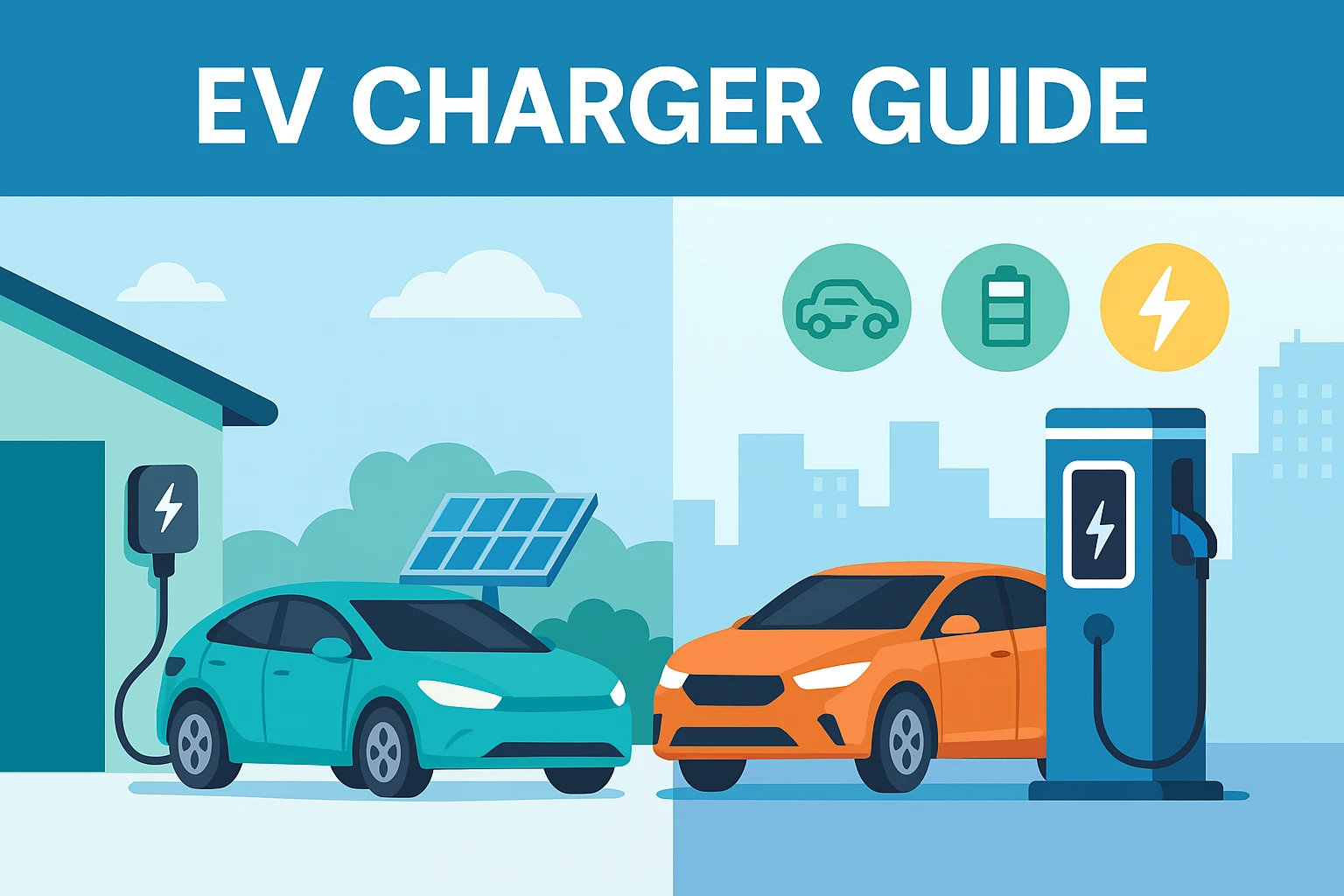Electric Vehicle (EV) adoption is rising rapidly, and with it comes a crucial component every EV owner must understand: the EV charger. Whether you're charging at home or using a public network, knowing the different electric vehicle EV charger types can save you time, money, and energy.
What Is an Electric Vehicle EV Charger?
An EV charger is a device that delivers electricity to your electric vehicle's battery. Unlike traditional gasoline refueling, EV chargers come in various types, power outputs, and features that impact charging time and convenience.
Types of EV Chargers Explained
Level 1 Charger
- Voltage: 120V (Standard household outlet)
- Charging Speed: 2-5 miles of range per hour
- Use Case: Ideal for overnight home charging
Level 2 Charger
- Voltage: 240V
- Charging Speed: 10-60 miles of range per hour
- Use Case: Best for home or commercial installations
- Popular Brands: JuiceBox, ChargePoint Home Flex, Wallbox
DC Fast Charging (Level 3)
- Voltage: 400V-900V
- Charging Speed: 60-200+ miles in 20-30 minutes
- Use Case: Ideal for public stations and long trips
- Examples: Tesla Supercharger, Electrify America, EVgo
Wireless Charging (Emerging Tech)
- Still under development but promises cable-free convenience
Home EV Chargers: Installation, Cost & Setup
Installing a home EV charger (typically Level 2) provides faster, more convenient charging.
Installation Requirements
- Dedicated 240V outlet or hardwired connection
- Professional installation recommended
- Proper grounding and circuit breakers
Average Costs
- Charger Unit: $400-$800
- Installation: $300-$1,000+
💡 Try our EV Charging Cost Calculator to estimate your total setup cost.
Public EV Charging: Availability and Networks
Public chargers are critical for long-distance travel or for EV owners without access to home charging.
Major Networks
- Tesla Supercharger: Fastest network, exclusive to Tesla (some opening to other EVs)
- ChargePoint: Wide availability, app-connected
- Electrify America: Focuses on DC fast charging
- Blink, EVgo, Greenlots: Other popular options
Charging Access
- Use mobile apps for real-time availability
- Membership-based or pay-as-you-go models
- Costs vary by network and charger speed
Charging Speed and Efficiency
Key Factors
- Charger type (Level 1/2/DC)
- EV battery size and charge rate
- Environmental conditions
| Charger Type | Average Speed | Time to 80% Charge (60 kWh battery) |
|---|---|---|
| Level 1 | 2-5 miles/hr | 24-36 hrs |
| Level 2 | 10-60 miles/hr | 4-8 hrs |
| DC Fast | 100-300 miles/hr | 30-45 mins |
Smart EV Chargers: Why They Matter
Smart chargers offer more than just electricity:
- Remote control via mobile app
- Scheduling: Charge during off-peak hours
- Energy monitoring
- Solar integration for green charging
Government Incentives and Rebates
Various government programs can significantly reduce the cost of installing a home EV charger:
- Federal Tax Credit: Up to 30% of charger and installation cost (capped)
- State & Local Rebates: Vary by location
- Utility Programs: Some offer free chargers or time-of-use rates
🔎 Check your eligibility with our EV Vehicle Compare Tool.
Maintenance, Safety & Lifespan of EV Chargers
Maintenance
- Keep connectors clean and dry
- Regularly inspect for wear
Safety
- Use certified electricians
- Choose UL-listed chargers
Lifespan
- Average: 8-10 years
- Warranty: Typically 3-5 years
Top EV Charger Brands and Models (2025)
| Brand | Model | Type | Smart Features | Price Range |
|---|---|---|---|---|
| JuiceBox | JuiceBox 40 | Level 2 | Yes | $500-$650 |
| ChargePoint | Home Flex | Level 2 | Yes | $600-$750 |
| Wallbox | Pulsar Plus | Level 2 | Yes | $500-$700 |
| Tesla | Gen 3 Wall Connector | Level 2 | Limited | $475 |
Verdict: Choosing the Right EV Charger
When choosing your ideal EV charger setup:
- Home Chargers offer long-term convenience
- Public Chargers are great for long trips or urban EV owners
- Smart Chargers provide energy savings and control
For most EV drivers, a combination of a Level 2 home charger and access to public DC fast chargers delivers the best balance of cost, convenience, and speed.
📚 Frequently Asked Questions (FAQ)
1. What's the difference between Level 1, 2, and DC Fast Chargers?
Level 1 is slow (2-5 mph), Level 2 is medium speed (10-60 mph), and DC Fast Charging is very fast (up to 200+ mph).
2. Can I install an EV charger at home myself?
It's recommended to hire a licensed electrician to ensure safety and compliance with local codes.
3. Are EV chargers compatible with all electric cars?
Most Level 1 and Level 2 chargers use the J1772 connector, compatible with most EVs. Tesla uses a proprietary plug but includes adapters.
4. How much does it cost to use a public EV charger?
Prices vary: AC chargers may cost $0.20-$0.40 per kWh, while DC fast chargers may range from $0.30-$0.60 per kWh or more.
5. Do I need a smart charger?
Smart chargers are optional but highly beneficial if you want scheduling, energy tracking, or solar integration.
Want to calculate how much you'll spend on charging? Use our EV Charging Cost Calculator.
Explore your EV options with our EV Vehicle Compare Tool.
